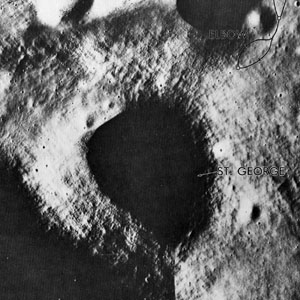St. George
Contents
St. George (Apollo 15 site crater name)
|
Lat: 26.0°N, Long: 3.5°E, Diam: 2 km, Depth: km, Rükl: 22, Upper Imbrian |
Apollo 15 Site Traverses Chart
Images
LPOD Photo Gallery Lunar Orbiter Images Apollo Images
- On Lunar Orbiter IV frame 102 h3 it (crater St. George) is noticeable just "below" (south of) the most eastern bend of Rima Hadley, on the northern slope of Mons Hadley Delta.- DannyCaes May 10, 2014
- See also Lunar Orbiter V frame 106 med.
Maps
(LAC zone 41B4) LAC map Geologic map LM map LTO map Topophotomap
Description
Description: Wikipedia
- St. George (correct link)
Additional Information
- The Landing Site Name "St. George" is plotted on Topophotomap 41B4/S1 .
Nomenclature
- Astronaut-named feature, Apollo 15 site.
- St. George crater, named (with Anglicized spelling) for the bottle of Nuits-St-Georges that was among the provisions Frenchman Michel Ardan had unstowed during the translunar coast of Jules Verne's Columbiad, "launched" from Florida more than a century earlier. See page 272 in -To a Rocky Moon; a Geologist's History of Lunar Exploration- by Don E. Wilhelms (University of Arizona Press, 1993).- DannyCaes May 10, 2014
- Is the name St. George Delta an official IAU name? (see the lower section of the LPI's list of Apollo photographs for crater St. George).- DannyCaes May 10, 2014
Excerpt of the ALSJ's David Scott interview (by Eric Jones), about the origin of the name St. George
The interview starts at 122:04:08 in the ALSJ's Apollo 15 page Driving to Elbow Crater.
- Scott: "Do you know why St. George Crater has it's name? 'Cause one night we were discussing what we would find at that crater - anorthosite or whatever. And Jack got in a heated discussion with somebody. I forget who it was, Lee Silver or Gordon Swann or somebody. But, you know, when Jack takes a position, he takes a pretty hard position. And they got down to 'I'll bet you'. 'What do you want to bet?' 'I'll bet you a bottle of wine.' 'Okay, I'll bet you a bottle of wine, what kind of wine?' And somebody says, 'You know, one of Jules Verne's characters (Michel Ardan) took a particular bottle of wine called Nuits-Saint-Georges to the Moon. Therefore, why don't we name the crater St. George Crater, after Jules Verne. And that's why it's St. George. That's what brought geology to life. That's the kind of thing that made it fun, it made it real, and it tied it in with other things. It got into the emotion of the time, which was good because it was great to hear somebody like Schmitt debate with somebody else what was going to be there, because the rest of us learned a lot from that. You listen to a debate, you learn a lot, right? So those kinds of things were a very meaningful part of the methodology. How did we learn how to be quasi-geologists on the Moon? Because of things like that. How could I ever forget that Schmitt had this argument about anorthosite at St. George? I can't forget that. So I get up around St. George, and there is a (mental) hook and, hanging on that hook, is a bottle of wine. And, as a total sidelight, after the mission was over, I got a package from George Low. In the package was a cork, from a bottle of Nuits-Saint-Georges that he had on the night we landed on the Moon, and he'd signed it. Not bad, huh?".
- ALSJ contributor Harald Kucharek notes that the village of Nuits-Saint-Georges is justifiably proud of its double connection with the Moon. In a 2001 e-mail message Dave Scott says that he and Jim (Irwin) and Al Worden made a visit in conjuction with their attendance at the 1971 Paris Air Show. Dave writes that Nuits-Saint-Georges is "a marvelous little town, with marvelous wine, marvelous food, and marvelous people!!!". He says that they were able to "enjoy the 'fruits' of our labor...(and were)...honored by being made citizens of Nuits. Just wish we could go back for another round!!!".
LPOD Articles
Bibliography
Don E. Wilhelms: To a Rocky Moon; a Geologist's History of Lunar Exploration.
Kenneth F. Weaver: Apollo 15 explores the mountains of the moon (National Geographic, February 1972).
David M. Harland: EXPLORING THE MOON; The Apollo Expeditions.
Eric M. Jones: APOLLO LUNAR SURFACE JOURNAL (ALSJ).
